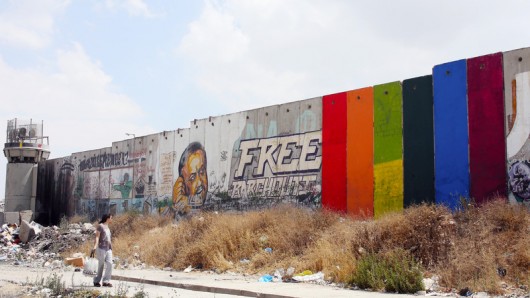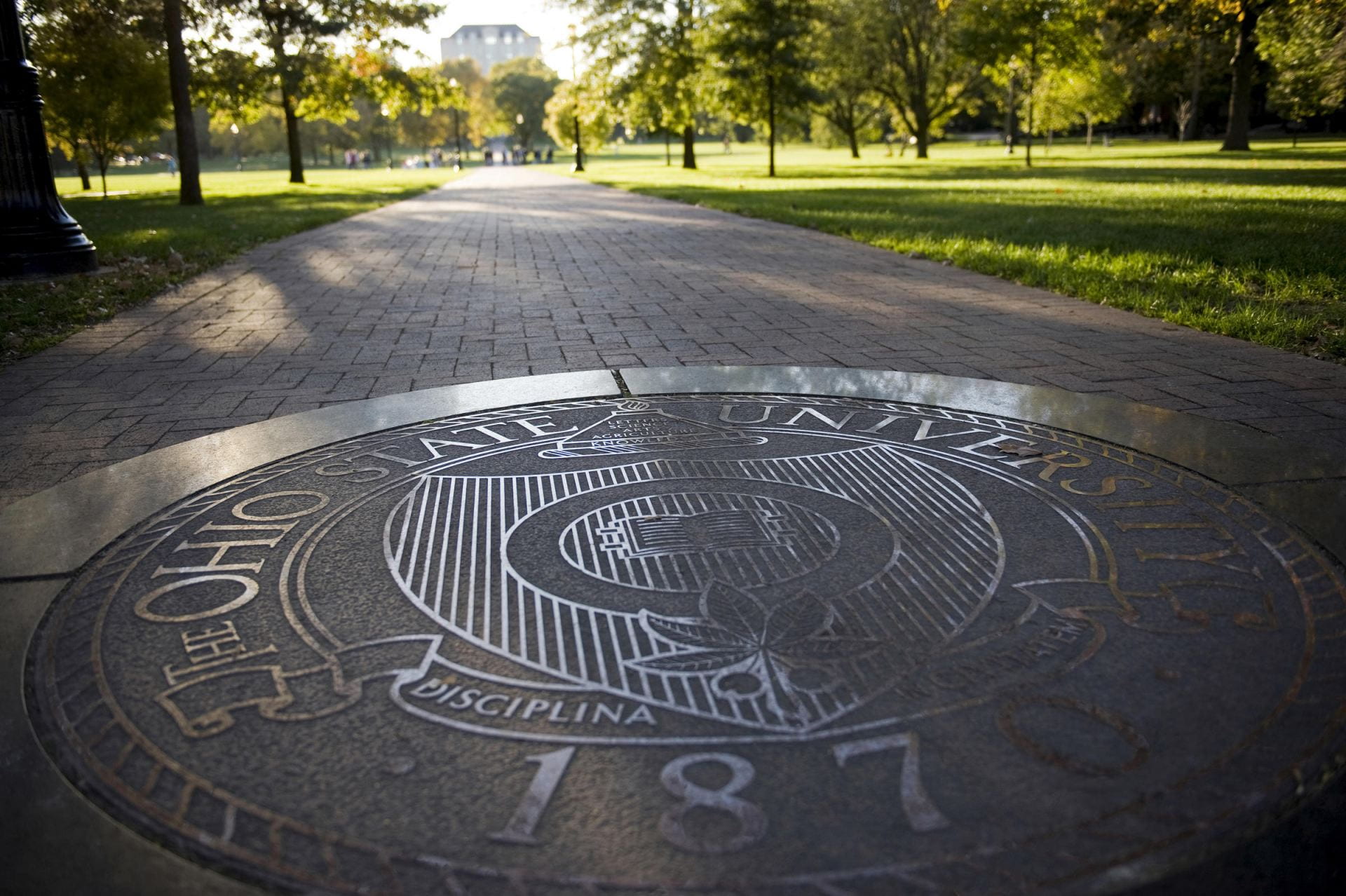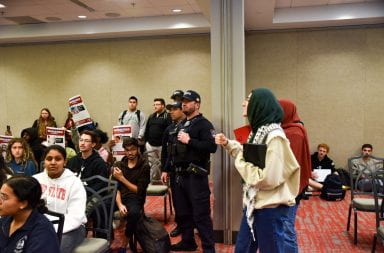
June 29, 2015, exclusive work of Khaled Jarrar on the Qalandia Checkpoint. Credit: Courtesy of Khaled Jarrar
An Open Letter to Robyn Frum:
This letter is a response to an editorial published on Dec. 1 conflating Zionism with the liberation struggles of several marginalized groups. As a Jewish lesbian and a queer Palestinian, we were troubled by Ms. Frum’s assertions about Israeli progressivism with regard to women, LGBTQ people, and religious and ethnic minorities. While we share her commitment to uniting to change the world for the better, her conflation of Zionism as a political theory with the state of Israel as it exists today obscures the reality of Israeli-Palestinian conflict.
Zionism
To claim that “Zionism” has never denied anyone freedoms or rights is deceiving. Of course it hasn’t — Zionism is an abstract concept, a body of political thought. Marxism has never denied anyone freedoms or rights, but the self-declared Marxist Chinese government has. In this way, Ms. Frum cleverly dodges responsibility for her argument by conflating Zionism, an abstract concept, with the state of Israel.
Zionism is not, as Ms. Frum writes, a liberation movement in the same vein as feminism or civil rights, but rather a political movement for a Jewish homeland. Born of late 19th-century secular Jewish thinkers, Zionism at its core is a response to centuries of unmitigated anti-Semitism, and it seeks to establish a Jewish state to ensure the safety and longevity of the Jewish people. It is not a Jewish liberation movement, and to claim that it “represents the struggle for freedom and equity” is somewhat misleading.
Ms. Frum writes: “The reconstitution of a modern Jewish state in Judea united Jews around the world.” Yet since its birth, Zionism has divided Jews over its meaning and implications. Many Jews are deeply critical of the circumstances surrounding the creation of the state of Israel, which have locked it into a decades-long cycle of violence that has cost thousands of lives.
Contrary to what Ms. Frum argues, Zionism has not “ensured (Jewish) safety and continuity in a dangerous world.” While the goal of a Zionist state of Israel was to stop the oppression that Jews have endured for centuries, the creation of the state of Israel hasn’t solved the problem of discrimination against the Jews worldwide. Whether Jews are safer in modern-day Israel than in other societies in which they have lived and continue to live is the subject of much debate; however, to assert that Israel has “ensured the safety” of Jews is simply untrue.
Measuring progressivism
When she writes, “no country in the Middle East can compare for its commitment to empowering women,” Ms. Frum does not suggest what exactly “empowering women” looks like or how we should measure governmental commitment to it. We don’t blame her, these are much-debated topics within the field of women’s studies.
However, she is wrong to make this claim without any evidence. Feminist movements have existed in Middle Eastern countries longer than the state of Israel has. Is she aware of the scholarship regarding the effects of Western colonialism on these movements? Does she know the names Nawal El-Sadawi, Huda Shawrawi and Ḥanan Al-Shaykh as well as she knows the names of Western feminists? The truth is that Ms. Frum does not need to research women’s empowerment initiatives in the 22 countries of the Middle East. She can rely on Western ignorance of Arab histories and contemporary Arab politics to uphold racist tropes of Arab societies as “more patriarchal” than others to make her point.
Additionally, we are troubled that Ms. Frum would uphold Israel as “promoting religious tolerance and fighting racial divides,” given that Israel’s history is fraught with both religious and ethnic tensions. Israel is infamous for forcibly administering birth control to Ethiopian Jews, segregating Israeli Arabs into slums, preventing Palestinian Muslims from attending mosques and feeding ethnic tensions by establishing settlements in Palestine in violation of international law, among many other human rights violations.
Pinkwashing
Ms Frum also participates in a “pinkwashing” of the Israeli-Palestinian conflict. When the Israel Defense Force threatens to out gay Palestinians to their families unless they become informants, is Israel “accepting the LGBTQ community”? With tactics like these, Israel encourages Palestinian communities to see their gay members as potential informants, fanning the flames of homophobia in Palestine while at the same time downplaying homophobia within Israel.
Is she aware that Iran has one of the most progressive governmental policies surrounding transgender rights in the world? With the exception of Thailand, Iran provides the highest number of sex reassignment surgeries in the world — and covers up to half the cost of this surgery. Meanwhile, Israel’s healthcare providers are notorious for being gatekeepers in regards to transgender healthcare, and transgender citizens usually leave the country to get surgery.
Moving forward
On the topic of civil rights victories being co-opted by the Israeli government, Aeyal Gross, a gay Israeli law professor, says that “gay rights have essentially become a public-relations tool.” The point here is not to debate which country’s government is “the best ally.” These issues are nuanced, and both Israel and Iran have a long way to go. The point is that, as women and members of the LGBTQ community, we refuse to be used as pawns in the nationalist quest to justify Israel’s egregious human rights violations.
As members of the Jewish and Palestinian communities, we caution people against blindly supporting a movement like Zionism without understanding its nuances and implications. Making claims that obscure the reality of the conflict only makes it more difficult to work toward justice. We want to encourage our communities to truly understand Zionism — its history, meaning and significance — as well as the complexities of Middle Eastern civil rights discourse, before drawing conclusions.
For those interested in these issues, we recommend the literary work of Theodor Herzl, Edward Said and Sarah Schulman.
Sincerely,
Leila Elaqad and Elaine Cleary
Leila Elaqad is a Palestinian-American third-year in sociology with a WGSS minor, as well as co-president of SHADES, OSU’s student organization for LGBTQ students of color.
Elaine Cleary is a third-year in economics and political science, as well as vice president of B’nai Keshet, OSU’s student organization for LGBTQ Jewish students.


